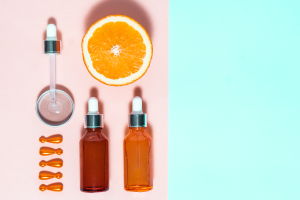

People who want to enhance the quality of their skin, reduce the effects of ageing, ease joint discomfort, and enhance their overall health and wellness may want to consider taking collagen. You might be curious about the difference between collagen and collagen peptides after hearing about them. In a nutshell, your body contains collagen, whereas collagen peptides are a dietary supplement that helps your body’s collagen supply be replenished.
Everything you need to know about collagen vs. collagen peptides, including its applications, benefits, and potential concerns, is covered .
What is Collagen?
Although it cannot be absorbed by diet, collagen is a long-chain of amino acids that helps to build our skin, connective tissue, and bones. It is predominantly composed of the three amino acids proline, hydroxyproline, and glycine, which distinguishes it from all other proteins and gives it its special functional features. It is also the most significant structural protein in the body.
Collagen is made up of three very long chains of about 1,000 repeated amino acids that twist into a triple-helix shape. Although this intricately twisted helix gives collagen its strength to build our bodies, it is also difficult to digest and is too big, making full-length, unhydrolyzed collagen an ineffective oral supplement.
Benefits of Collagen
It’s important to watch how much collagen we consume as we age since it degrades more quickly and is produced at a lower rate. While there are numerous unique benefits that people may reap, it is essential for overall physical wellness. For instance, enough collagen levels support strong bones, joints, and hair. To truly understand how efficiently collagen supplements help in tissue healing, more study is necessary.
Collagen is essential for the durability and strength of tendons, which can deteriorate with age. Supplement use may help to strengthen tendons and other joint structures. Our bone mass, which is largely composed of collagen, is something that changes as we age. Increasing collagen consumption with supplements may occasionally help to mitigate this.
What are Collagen Peptides?
Collagen peptides, also known as collagen hydrolysate, are made of short chains of amino acids. It’s important to know that collagen peptides and gelatin are produced by dissolving the full-length collagen molecules in order to comprehend the difference between collagen and collagen peptides. Although they have the same amino acids as collagen, they function differently.
Collagen peptides travel throughout the body after ingestion and absorption, repairing, rebuilding, and supplying energy. Collagen peptides are transported to the various tissues where cells convert the peptides into full-length collagen helices to restore the health of our skin, bones, and joints or the cells can use the amino acids as energy directly.
Benefits of Collagen Peptides
There are many alleged collagen peptide benefits but only a few handful have received significant research. These possible benefits include reduction in osteoarthritis and improvement in ageing skin. Although these peptides are primarily ingested to repair damaged collagen, they may also be beneficial for other health conditions, such as:
- Cartilage deterioration: Recent research has focused on the connections between collagen peptide supplements and the prevention of osteoarthritis.
- Treat Heart conditions: Arteries are another organ that depends on collagen for proper function and maintaining structural integrity. By maintaining healthy arteries, collagen peptide supplements may help lower chances for heart diseases.
- Prevent Loss of Muscle mass: Exercise and collagen peptides may help prevent sarcopenia, the ageing-related loss of muscular mass.
- Improve Skin Health: Research has linked collagen peptide supplements to better skin health, including hydration and elasticity.
What’s the Difference Between Collagen and Collagen Peptides?
One important difference between collagen and collagen peptides is that collagen peptides are typically more accessible; as a result, they are better absorbed into the bloodstream than collagen and gelatin because they have considerably shorter chains of amino acids. Collagen peptides are more easily broken down into a state that can enter the bloodstream following digestion because they are fully hydrolyzed and consequently shorter. Collagen peptides are just the more disintegrated version of collagen.
Are There Any Drawbacks of Collagen & Collagen Peptides?
You might be wondering if collagen and collagen peptides have any drawbacks given all the advantages of collagen.
Both could have negative effects, particularly if you are allergic to foods that are sources of collagen, such as fish, shellfish, or eggs. For instance, consuming collagen peptides originating from marine sources may cause itching, widespread urticaria (or hives), and breathing difficulties in someone who is sensitive to seafood.
Another example is injecting collagen beneath the skin, which can result in bruising, swelling, redness, and even scarring.
However, collagen supplements are often well tolerated.
Consult with a qualified healthcare provider when getting collagen treatments, regardless of whether you’re consuming collagen peptides, using collagen sheets, or getting an injection.
Conclusion
Both collagen peptides and full-length or unhydrolyzed collagen contain the same amino acids and are useful for giving your body structure. Reducing the effects of ageing, enhancing bone and joint health, and supporting the gut are some of the specific uses.
One notable difference is that collagen peptides are completely soluble and digestible, in contrast to unhydrolyzed collagen, which is insoluble and indigestible. This is why collagen peptides are excellent as dietary supplements.
The collagen levels in our bodies naturally decline as we age, but we can support them by leading a healthy lifestyle, abstaining from sugar, excessive sun exposure, smoking, and alcohol, and consuming foods high in amino acids (like meat) and vitamin C.




